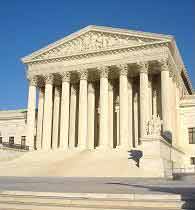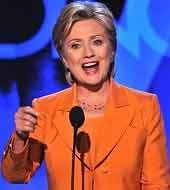
The Supreme Court of the United States was asked on Wednesday to reconsider a longstanding ban on direct political contributions from corporations and labor unions. The high court heard oral arguments in a case concerning a controversial film about then-presidential candidate Hillary Clinton last year.
The case could have far-reaching implications for how U.S. election campaigns are financed.
Congress banned corporations from giving direct donations to political candidates in 1907. Labor unions were restricted, beginning in 1947. Corporations and unions are allowed to make limited contributions indirectly through political action committees.
At issue in the current case before the Supreme Court is a documentary made by a conservative group last year about then-presidential candidate Hillary Clinton, who now serves as President Barack Obama's Secretary of State.

The government blocked access to the film for cable television subscribers on the grounds that it was a thinly veiled political attack, the kind of political attack ad restricted by federal campaign finance laws.
This is a clip from Hillary: The Movie:
1st voice: "She was the first First Lady to come under criminal investigation."
2nd voice: "Hillary Clinton's scandals are a gift that keeps on giving."
The film was financed by the conservative group Citizens United.
Many conservatives regard federal and state limits on political contributions as unacceptable restrictions on free expression guaranteed by the U.S. Constitution.
Former Bush administration official and now private lawyer, Ted Olson argued the case before the Supreme Court on behalf of Citizens United.
"Robust debate about candidates for elective office is the most fundamental value protected by the First Amendment's guarantee of free speech," said Ted Olson. "Yet that is precisely the dialogue that the government has prohibited if practiced by unions or corporations."
Supporters of current federal law argue that lifting the restrictions on corporate donations to political candidates would radically alter the way campaigns are financed and could invite corporate influence-buying and corruption.
Republican Senator John McCain of Arizona co-authored sweeping campaign finance regulations in 2002 along with Democratic Senator Russ Feingold of Wisconsin.
McCain spoke to reporters outside the Supreme Court after listening to Wednesday's oral arguments.
"Does anyone believe that the rights of average citizens to be heard in Washington would not be overridden by massive, unlimited campaign contributions from corporations and unions? That is a disconnect from reality," said Senator McCain. "We saw the corruption. That is why we acted and that is why Congress acted."
The Supreme Court initially heard the case in March, but later decided to consider expanded arguments covering previous court precedents in campaign finance law.
Wednesday's oral arguments were the first attended by the Supreme Court's newest justice, Sonia Sotomayor. Justice Sotomayor was confirmed by the Senate last month as President Obama's first appointee to the high court. She is also the first Hispanic justice on the Supreme Court.
A decision on the campaign finance case is expected during the next few months. The Supreme Court will officially begin its new term in October.
override: to set aside or disregard (a person or a person's decisions) by having superior authority or power 不顾,无视(Considerations of safety override all other concerns. 对安全的考虑压倒一切。)
Related stories:
Clinton: Faith got me past marital woes
非洲学生惹恼希拉里 “我才是国务卿”
希拉里赠俄外长礼物 拼错单词闹笑话
US State of Illinois opens new chapter in its corruption history
Watergate: A symbol of political corruption
(Source: VOA 英语点津编辑)